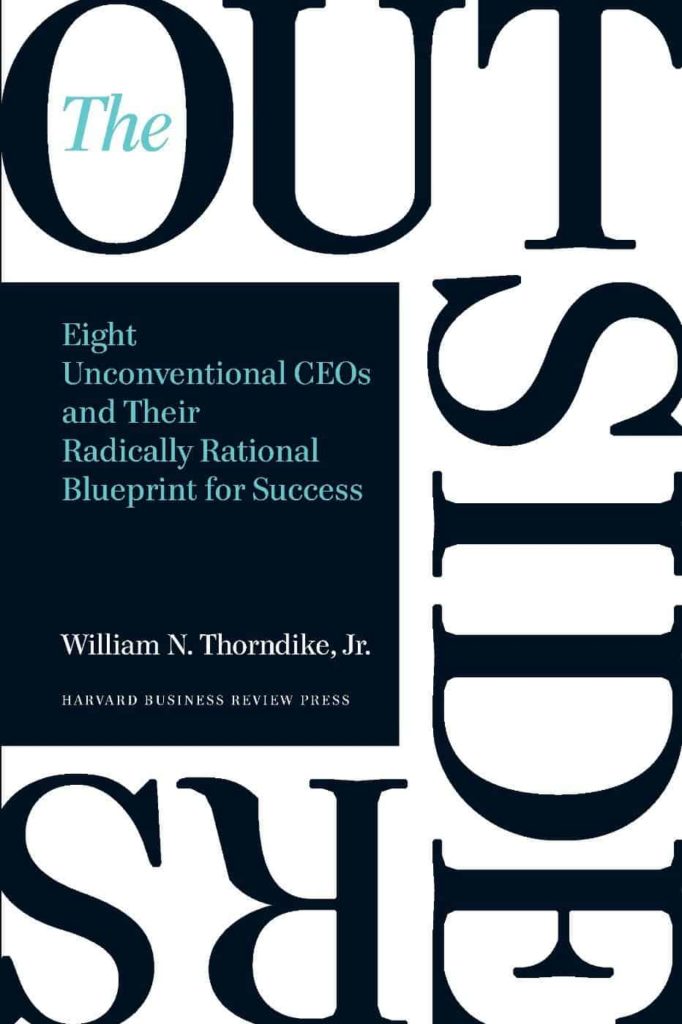Last updated: March 23, 2022
The subtitle of The Outsiders book by William N. Thorndike, Jr. is “Eight Unconventional CEOs and Their Radically Rational Blueprint for Success.”
I liked this book a lot! I recommend it for anyone who owns or runs a business.
I’ll show you my key takeaways and summary from this great business book.
Key Takeaways
- The press focuses too much on a company’s growth in revenue and profits.
- The correct measure of CEO success should be the increase in a company’s per share value, especially as compared to peers in the market.
- Capital allocation is a CEO’s most important job.
- Cash flow determines long-term value.
How to Qualify as An Outsider CEO: Their company had to handily beat its peers and Jack Welch’s GE in terms of relative market performance.
Capital Allocation in The Outsiders
Capital allocation is “the process of deciding how to deploy the firm’s resources to earn the best possible return for shareholders.”
Good analogy: capital allocation = investing.
CEOs have to do two things:
- Run the business well enough to generate cash,
- Deploy said profits, aka capital allocation.
This book focuses on capital allocation, arguing that it might be the most important responsibility that any CEO has.
Warren Buffet laments that very few CEOs are prepared to allocate capital in their business:
“The heads of many companies are not skilled in capital allocation. Their inadequacy is not surprising. Most bosses rise to the top because they have excelled in an aera such as marketing, production, engineering, administration, or sometimes, institutional politics. Once they become CEOs, they now must make capital allocation decisions, a critical job that they may have never tackled and that is not easily mastered. To stretch the point, it’s as if the final step for a highly talented musician was not to perform at Carnegie Hall, but instead, to be named Chairman of the Federal Reserve.”
Bershire Hathaway annual reports, 1987
Five Choices for Deploying Capital
How does a business spend its money? Thorndike says these are the ways:
- Investing in existing operations,
- Acquiring other businesses,
- Issuing dividends,
- Paying down debt,
- Repurchasing stock.
Three Choices for Raising Capital
The book describes three main choices for how a business can raise capital:
- Internal cash flow,
- Issuing debt,
- Raising equity.
Characteristics of Outsider CEOs
Thorndike identifies these unique and positive characteristics of successful CEOs, as described in the book The Outsiders:
- Frugal
- Humble
- Analytical
- Independent
- Understated
- Practical
He continues with more positive characteristics:
- Devoted to their families
- Rarely appeared on covers of business publications
- Not marketers
- Lack of charisma
- First-time CEOs, most with very little prior management experience
- New to their industries
- Fresh perspective
- “Labored in relative obscurity and were generally appreciated by only a handful of sophisticated investors and aficionados.”
- Worked out of barebones offices
- Actively avoided bankers and other advisers
- Prefer decentralized organizational structures that self-select for other independent thinkers
- High debt levels (except for Warren Buffet)
The Outsiders: 8 Unconventional CEOs
The book highlights and features these CEOs:
- Capital Cities Broadcasting, Tom Murphy
- Teledyne, Henry Singleton
- General Dynamics, Bill Anders
- TCI, John Malone
- The Washington Post Company, Katharine Graham
- Ralston Purina, Bill Stiritz
- General Cinema, Dick Smith
- Berkshire Hathaway, Warren Buffet
Conclusion
Related Resources
- One of the best business books I’ve ever read – Shoe Dog by Phil Knight.
- Check out why and when the management is among the most noble of professions while reading my summary of the book “How Will You Measure Your Life?” by Clayton M. Christensen.
- Speaking of measures, here are the notes and discussion topics from our book club about “Measure What Matters” by John Doerr.

